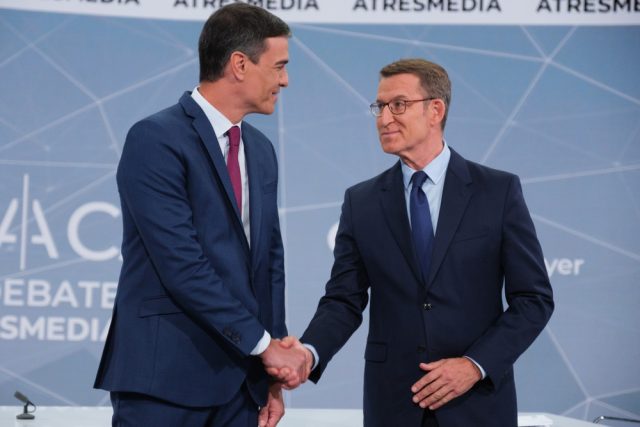
The Spanish candidate for premier, Alberto Nuñez Feijóo from the Popular Party (PP, EEP), has made his move: in exchange for a favourable vote or an abstention from the left-wing Socialist Party (PSOE, S&D) in the investiture vote, he is willing to shorten his presidency’s term to two years were both parties pass six major pieces of legislation.
The response, blunt and expected, of its left-wing counterpart has been a deafening no. Additionally, PSOE’s leader, Pedro Sánchez, has criticized Feijóo’s attempts and urged him to renew the General Council of the Judiciary by the end of the year. This latest face off leaves Spanish politics in the same state of confusion it set out to resolve, and it appears unlikely to change before the end of September deadline.
One week after King Felipe VI invited Feijóo to form a government, the candidate met its socialist rival Sánchez in the Spanish Parliament and presented a new formula for a government “for the sake of centrality so that the most voted list can govern our country, as has been the custom for the last 45 years”.
The new proposal will make Feijóo Spain’s next president for a short two-year term where both parties pass six “state pacts” or bipartisan legislation centred on democratic regeneration, social welfare, economic recovery, family policy, territorial policy, and water management. The 15 ministries-led government will end when these six pacts are materialized or if 24 months pass. Here, new general elections will be called for unless signing parties agree to continue the legislature to carry out these pacts or agree on new ones.
The first proposed “state act” focuses on “democracy regeneration” through which they pose a legislation that will ensure the independence of the judiciary from the government. The second pact focuses on social welfare, calling for reform to ensure the viability of the National Health System, the stability and quality of the education system, gender equality and the viability of the pension system. Thirdly, the centre-ring wing candidate suggests a new pact centred on economic recovery whose linchpin is the protection of those who are most vulnerable and the middle class, as well as helping young people fight of difficulties. The fourth and fifth agreements focus on family policies to improve conciliation and ensuring access to water resources. The sixth and last pact poses a new model for financing at the autonomous and local levels that guarantees equal access to services.
The attempt to strike a middle-ground has met with apprehension from the left-wing party of Sánchez. In the press conference following the meeting, the party’s representative and acting Minister of Education and Vocational Training, Pilar Alegría, dismissed the possibility of following through with the proposal. Specifically, the spokeswoman argued that the Feijóo lacked credibility to carry on with the initiative. For his part, Sánchez limited himself to deflecting by reminding the PP leader to focus on renewing the General Council of the Judiciary by the end of the year. The renewal of the CGPJ has been impeded by a political gridlock that has paralyzed the appointments to this judicial body.
Members of PP like the Community of Madrid’s president, Isabel Díaz Ayuso, has openly criticized the decision taken by PSOE, highlighting that Sánchez is saying “no” outright to the party holding the most votes, yet will say yes to any of the demands made by independentists. Similarly, the president of PP in the Basque Country, Carlos Iturgaiz, has criticized PSOE and acting president, for “only having ears for independentists”. For its part, the president of the Conservative Party Vox, Santiago Abascal, has chosen to avoid discussing the pact until the investiture vote that will be held on September 26th and 27th.



 Subscribe
Subscribe